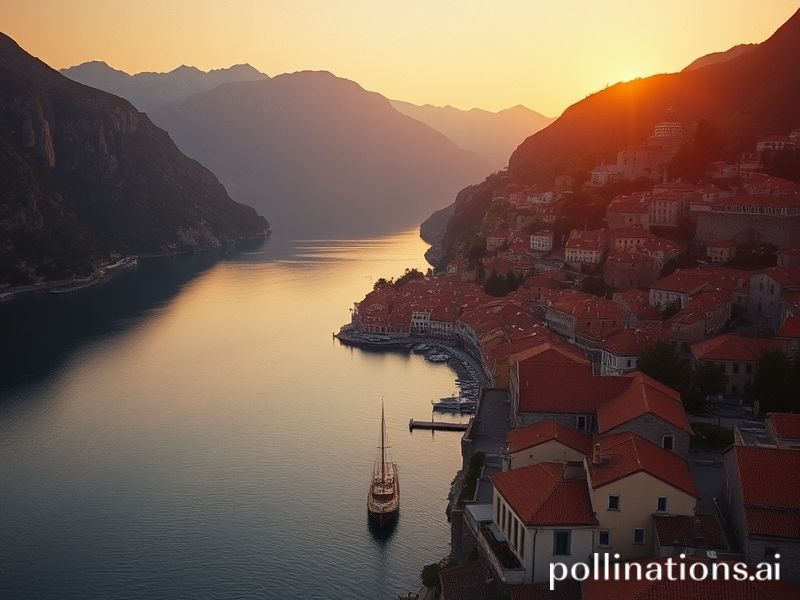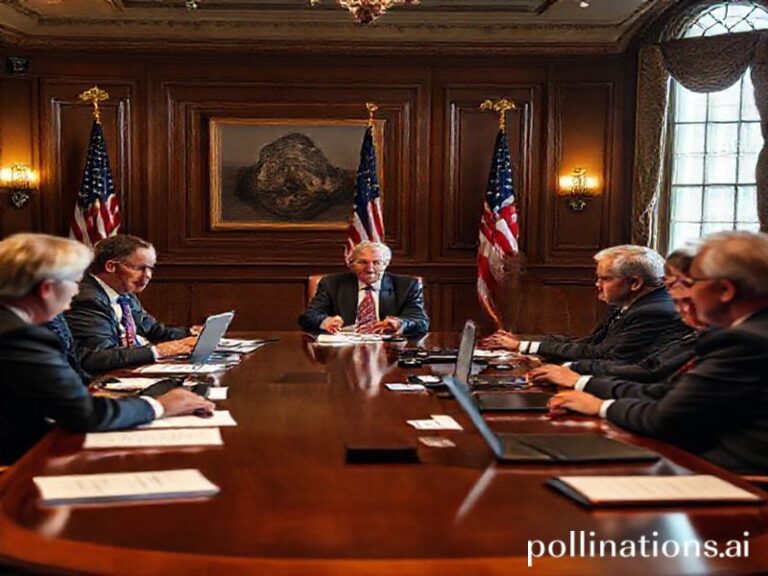Montenegro: NATO’s Tiniest Ally, Russia’s Favorite Parking Spot, and China’s Asphalt Lab
The World’s Smallest Great Power: Montenegro as a Geopolitical Punchline
By Our Correspondent, still hung-over from a rakija-soaked night in Kotor
The Adriatic has always been Europe’s liquid catwalk: Venice glides by in designer decay, Croatia flaunts newly-acquired EU pins, and then—barely visible unless you squint—Montenegro struts in borrowed shoes two sizes too big. At 13,812 km² (roughly the size of Connecticut, but with better seafood), Montenegro has perfected the art of being strategically adorable. It contains NATO’s newest and most diminutive member, Russia’s favorite offshore laundromat, and China’s Belt-and-Road debt-dentistry patient—all simultaneously, like a matryoshka doll stuffed with contradictory lobbyists.
To grasp the cosmic joke, zoom out. In an era when superpowers measure influence in aircraft-carrier tonnage and semiconductor supremacy, Montenegro’s geopolitical leverage is measured in fjords per capita. One deepwater bay (Kotor, so photogenic it could run for office) hosts both a U.S. destroyer on “freedom of navigation” and a Russian super-yacht registered to a Cayman shell that answers to a St. Petersburg voicemail. The same pier welcomes Chinese surveyors scouting for a 5G tower that will beam TikTok dances straight to Brussels’ nightmares. Call it multivector kleptocracy: Montenegro charges admission to every sphere of influence, then sells the T-shirts.
The West clings to Podgorica like a guilty ex who keeps “checking in.” When Montenegro joined NATO in 2017, the alliance celebrated the addition of 1,950 active-duty troops—roughly the size of a medium American high-school football program. Yet the accession ceremony was held precisely to irritate Moscow, which had allegedly dispatched a follicularly challenged duo to storm parliament in 2016 with the subtlety of a Bond plot cut for budget. The coup failed, partly because the would-be revolutionaries stopped for selfies at a gas station. Montenegro thus became the first country in history to foil a Russian special operation with Instagram.
Meanwhile, Beijing dangles the Bar-Boljare motorway, a 165-km asphalt dragon whose price tag (€1.1 billion and counting) exceeds Montenegro’s annual GDP. Chinese engineers blast tunnels through limestone like bored gods playing Minecraft; local ministers sign loan extensions like teenagers forging report cards. The IMF warns the debt ratio could hit 103% of GDP, which in Montenegrin translates to “not our problem until after the next election.” Should Montenegro default, rumor has it China will accept collateral in the form of Kotor’s medieval walls—ideal for shipping flat-pack.
Europe, ever the fretful chaperone, waves its €3 billion Enlargement Wallet while muttering about “rule-of-law benchmarks.” Brussels demands that Montenegro curb corruption, which is akin to asking Venice to curb water. The EU’s newest report politely notes that 98% of court cases remain unresolved since the Bronze Age (slight exaggeration), but still extends the carrot of accession talks—because admitting a micro-state with more goats than judges is apparently the continent’s last growth strategy. In return, Montenegro promises reforms scheduled for the 12th of Never, a date conveniently after the tourist season.
Global implications? Picture a world map drawn by a drunk cartographer. Every chokepoint now hosts a boutique nation willing to rent sovereignty by the hour. Montenegro is merely the cutest canary in this transactional coal mine. When the U.S. Navy docks, it’s “rules-based order.” When oligarchs anchor, it’s “neutral business climate.” When Chinese cranes arrive, it’s “connectivity.” Montenegro’s true export is plausible deniability, bottled at 42% ABV and labeled “Made in Montenegro—Contents May Shift During Transit.”
The cynic’s takeaway: In the 21st-century bazaar, size doesn’t matter; ambiguity does. Montenegro proves you can be a geopolitical superpower so long as nobody agrees what you actually are. The rest of us, lumbering around with actual economies and armies, can only watch in envy as this mountainous haiku of a country pockets everyone’s money while humming “I’m just a soul whose intentions are good—please don’t drone me, bro.”
And so the Adriatic sun sets, gilding the bay where Montenegro’s flag flaps above a NATO radar, a Russian nightclub, and a Huawei router—all on the same pole. If that isn’t the future of international relations, we might as well start taking our multilateralism straight, no chaser.







